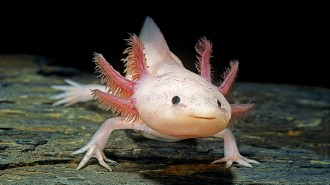Drugs slow aging in worms
Mimicking enzymes found in most animals, two drugs can extend the life span of worms by more than 50 percent, according to a study in the Sept. 1 Science. Supporting a popular theory of aging, the drugs work by defusing the highly reactive oxygen-containing molecules commonly known as free radicals.
This is the first time scientists have shown that a drug treatment can significantly lengthen an animal’s normal life span, notes study coauthor Simon Melov of the Buck Institute for Age Research in Novato, Calif.
The new work builds on the hypothesis that aging results from the assault of free radicals on the body’s DNA and other molecules. The destructive molecules are byproducts of cells’ use of oxygen to generate energy. Cells, however, aren’t defenseless against the free radical barrage.
They possess enzymes, such as superoxide dismutase and catalase, that defuse the reactive molecules.
These protectors can’t catch every free radical, so scientists have sought ways to boost an animal’s antioxidant arsenal. In one recent experiment, they imbued fruit flies with extra copies of the gene for superoxide dismutase. These insects lived one-third longer than normal flies.
For their worm study, Melov and his colleagues turned to two drugs that are synthetic forms of catalase and superoxide dismutase. Eukarion, the biotech firm in Bedford, Mass., that developed the drugs, has shown that the compounds thwart free radical damage in mice suffering strokes or conditions similar to Alzheimer’s or Parkinson’s disease. The company plans to begin testing the drugs in people within a year or so.
Except at very high doses, the drugs don’t seem to have any side effects in mice, notes Melov. The same held true in his worm experiments. When fed regularly to the nematode Caenorhabditis elegans, the drugs on average added more than 1 week to the worm’s usual life span of about 3 weeks. The compounds even normalized the life span of a worm strain with a genetic mutation that typically shortens its life by about one-third.
The scientists have started experiments to see if the drugs prolong the lives of normal mice. Says Melov, “It’s one thing to talk about worms. It will really get people excited if we get the same results in mice.”
Still, the worm study has surprised many scientists, says Melov. “It was only 5 years ago that I heard a very prominent gerontologist at a major aging meeting say that there would never be any drug that extends life span in any organism,” he remarks.







